Several schools in Calcutta are facing a growing challenge: students are increasingly relying on artificial intelligence to complete assignments, write essays, and even handle basic communication, leaving teachers struggling to maintain academic integrity.
The extent of AI dependency has surprised educators. In one school, after a Class X teacher assigned a project on Gandhi that required watching Richard Attenborough’s film, students showed little interest in viewing the movie and instead generated AI content. In another instance, students recorded their principal’s verbal instructions during a briefing and converted the audio to text, avoiding the effort of taking notes.
“Of course, students are using AI because it is so easily available. Teachers can understand it, but what can they do?” said Meena Kak, director of Lakshmipat Singhania Academy.
The AI usage extends beyond major assignments. Students routinely use AI for emails, and even for minor tasks.
Educators express deep concern about the cognitive effects of this dependency. Joseph Chacko, senior coordinator and English teacher at St James’ School, believes over-reliance on AI is undermining students’ fundamental abilities.
“AI has made access to information easier but is ruining their creativity, imagination, ability to think, and do research,” Chacko said. “They believe the information they are sourcing from the internet to be the absolute truth, and you cannot contradict them.”
Students often copy AI content wholesale with minimal modifications, demonstrating an inability to evaluate or filter information critically. Some have become sophisticated — the smarter ones prompt AI to include deliberate mistakes so their work appears authentically student-written, according to Rodney Borneo, principal of St Augustine’s Day School, Shyamnagar. “A high percentage of students in class are using AI. They don’t even want to make an effort that would make learning interesting,” Borneo said.
Rather than attempting to ban AI use entirely — which many acknowledge as futile — educators are reimagining their approach to teaching and assessment. “We understand that they will take the help of AI, but what we try to tell them is not to completely copy and paste from the Internet because that takes away the challenge of learning and comprehending,” said Gargi Banerjee, principal of Sri Sri Academy.
The shift requires fundamental changes in classroom dynamics. Meena Kak of Lakshmipat Singhania Academy noted that simply delivering content is no longer sufficient since students have ready access to information. “Teachers have to make classrooms more challenging and dynamic spaces,” she said.
Assessment methods are also evolving. Satabdi Bhattacharjee, principal of The Newtown School, emphasises the need for different types of questions. “We cannot stop students from referring to ChatGPT or AI, but the questions have to be open-ended, where a child’s perspective or understanding of a subject is evaluated.”
Despite the challenges, educators remain optimistic about their ability to guide students toward responsible AI use. The consensus among educators is clear:
AI cannot be eliminated from students’ lives, but schools must teach judicious use
rather than complete dependence. The goal is to help students develop the critical thinking skills necessary to use AI as a tool for learning rather than a replacement
for thinking.











